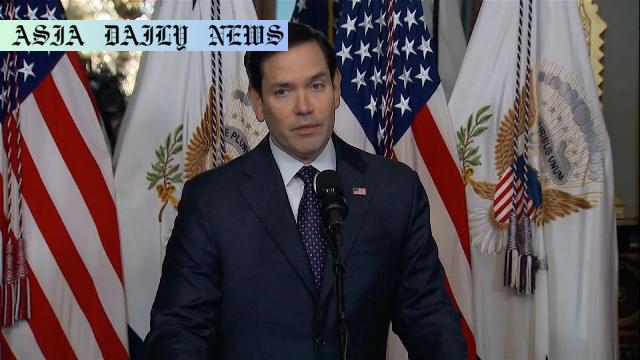Panama Canal: US Secretary of State Marco Rubio will visit Panama next week to address canal management concerns and Trump’s remarks.
US Secretary of State Marco Rubio to visit Panama for discussions.
Amid Trump’s claim of high fees, tensions over canal control spark.
The Panama Canal is currently governed solely by Panama.

Introduction: The Panama Canal at the Center of US-Panama Relations
The Panama Canal, an enduring symbol of international trade and cooperation, has recently become the focal point of political and economic tensions between the United States and Panama. US Secretary of State, Marco Rubio, is set to visit Panama next week in what appears to be an attempt to ease the growing friction caused by President Donald Trump’s controversial remarks on canal management. Trump’s claims about the canal being unfairly priced have stirred sharp reactions from the Panamanian government and even caught the attention of the United Nations.
Background: A Historical Connection
The Panama Canal, a significant trade route linking the Atlantic and Pacific Oceans, holds immense strategic and economic value. Built by the United States in the early 20th century, the canal was handed over to the Panamanian government in 1999, following decades of diplomatic negotiations. The transition marked a new era of sovereignty for Panama, which has since operated and managed the waterway.
President Trump’s recent assertion that the US should consider reclaiming control of the canal has reignited debates about its ownership and fees. Historically, such rhetoric has been rare, highlighting the uniqueness of the current strain in US-Panama relations.
Trump’s Claims and Their Implications
In statements that have drawn widespread attention, President Trump argued that fees charged for using the Panama Canal are excessively high and unfair to American businesses. He even floated the idea of demanding the canal’s return if the US was not treated fairly, a suggestion that has alarmed both Panamanians and international observers.
The Panamanian government responded with strong opposition, stating that the canal’s management remains a matter of national sovereignty. The United Nations, recognizing the potential for broader geopolitical tension, has also voiced its concerns about the escalating rhetoric.
Rubio’s Role in Diplomacy
Marco Rubio’s trip to Panama marks his first international visit as US Secretary of State. The visit underscores the importance of resolving the canal-related tensions amicably. During his trip, Rubio is expected to meet with Panamanian officials to discuss the canal’s operations and explore ways to address President Trump’s concerns without undermining Panama’s sovereignty.
Observers note that Rubio’s diplomatic approach will be critical in diffusing the situation. Maintaining a strong bilateral relationship is essential, given the canal’s significance in global trade and its role as a bridge between North and South America.
The Global Significance of the Panama Canal
Beyond its bilateral implications, the Panama Canal is a linchpin in the global economy. Each year, millions of tons of cargo pass through its locks, making it a vital trade route for countries worldwide. Any disruption to its operations could have ripple effects across industries, from shipping and logistics to manufacturing and agriculture.
Panama’s administration has invested heavily in the canal’s modernization, including a multi-billion-dollar expansion completed in 2016. These efforts have cemented Panama’s reputation as a reliable custodian of the canal. Calls to challenge the current arrangement risk undermining these achievements and spurring unnecessary economic uncertainty.
Looking Forward: A Path to Resolution
As Rubio prepares for his visit, the stakes remain high. Both the US and Panama have significant interests in preserving the functionality and accessibility of the canal. Diplomacy, as always, will be key.
The visit offers an opportunity not only to address the specific concerns raised by President Trump but also to strengthen the ties between the two nations. With careful negotiation and mutual respect, it is possible to overcome this moment of tension and ensure that the Panama Canal continues to serve as a model of international cooperation and trade.



Commentary
The Complexity of US-Panama Relations
The remarks by President Trump about reclaiming the Panama Canal bring forth a mix of historical nostalgia and geopolitical tension. For many Americans, the canal represents a bygone era of US industrial might and international influence. However, it is essential to remember that the canal has been under Panamanian sovereignty for decades, and any attempt to undermine that would be met with widespread resistance, both domestically in Panama and on the global stage.
The Importance of Diplomatic Nuance
In these kinds of situations, diplomacy is key. Marco Rubio’s upcoming visit has the potential to either escalate or mitigate tensions, depending on how the discussions are handled. Emphasizing fair trade practices and mutual benefits without veering into territorial or sovereignty disputes will be critical in maintaining the longstanding friendship between the US and Panama.
Broader Lessons for International Policy
The incident also serves as a broader lesson in international relations: rhetoric matters. While tough talk may appeal to certain domestic audiences, it can complicate delicate relationships abroad. The Panama Canal is not just a bilateral asset but a global one, and its management affects nations far beyond the Americas. Maintaining its neutrality and efficiency should be the primary concern for all parties involved.